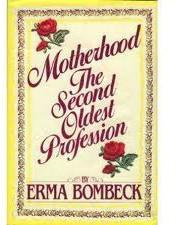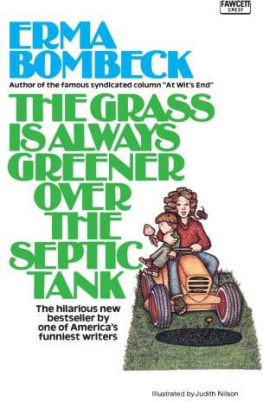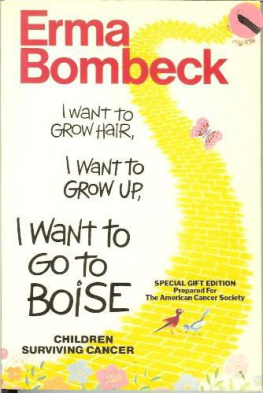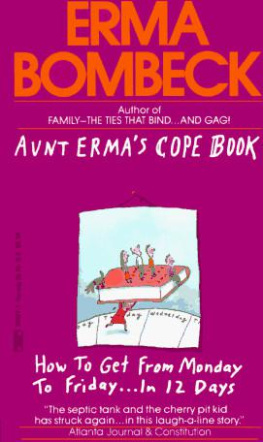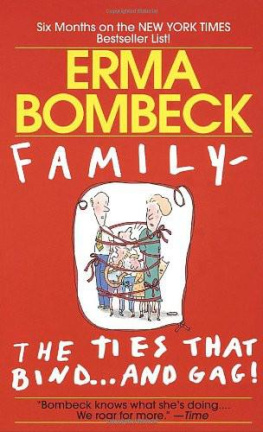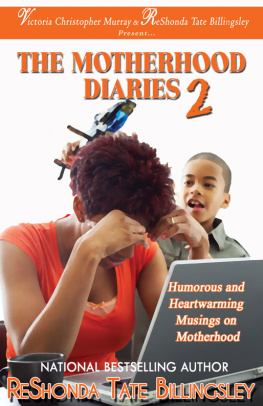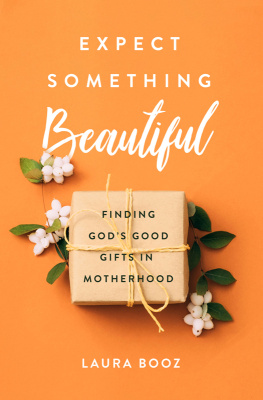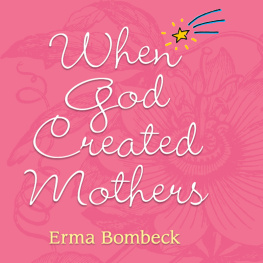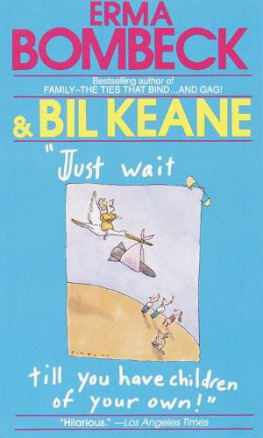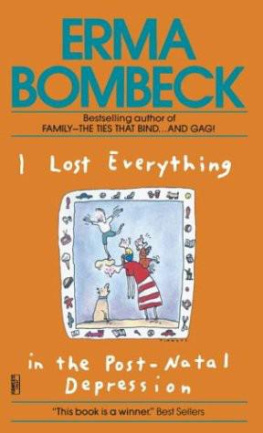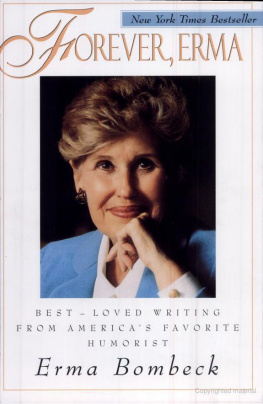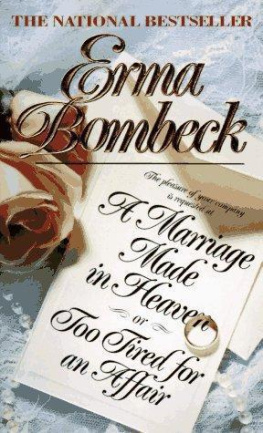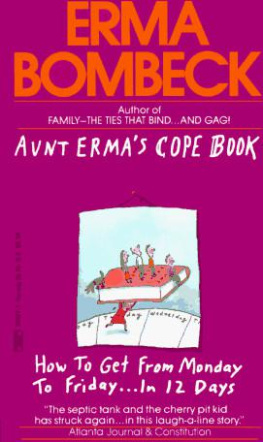Unknown
Motherhood
The
Second
Oldest
Profession
Also by Erma Bombeck:
At Wit's End
Just Wait Till You Have Children of Your Own!
I Lost Everything in the Post-Natal Depression
The Grass Is Always Greener over the Septic Tank
If Life Is a Bowl of CherriesWhat Am I Doing in the Pits?
Aunt Erma's Cope Book: How to Get From Monday to Friday... In 12 Days
Motherhood
The
Second
Oldest
Profession
by
ERMA BOMBECK
MC GBAW-HILL BOOK COMPANY
New York St. Louis San Francisco
Mexico Toronto Hamburg London Sydney
Copyright 1983 by Erma Bombeck
All rights reserved. Printed in the United States of America. Except as permitted under the Copyright Act of 1976, no part of this publication may be reproduced or distributed in any form or by any means or stored in a data base or retrieval system, without the prior written permission of the publisher.
1234567 8 9DOCDOC876543
ISBN 0-D7-ODb454-7
LIBRARY- OF CONGRESS CATALOGING IN PUBLICATION DATA
Bombeck, Erma.
Motherhood, the second oldest profession.
1. MothersAnecdotes, facetiae, satire, etc.
1. Title.
HQ759.B64 1983 306.8'743 83-9813
ISBN 0-07-006454-7
Book design by Roberta Rezk
There are a lot of proper names in this book.
None of them is real with the exception of my
mother's, whose name is Erma.
If there is a name the same as yours, it is pure coincidence.
erma bombeck
Contents
Introduction 1
1. So You Want to Be a Mother! 5
2. Donna {Donna Reed Show), Harriet (Ozzie and Harriet), Barbara [Leave It to Beaver), Shirley [Partridge Family), Marjorie (Make Room for Daddy), Jane (Father Knows Best), Florence (The Brady Bunch) 9
3. Frank 14
4. Connie 21
5. Everybody Else's Mother 25
6. The First Day of School for The Baby 28
7. Pacifier Pioneers 31
8. Who Are Harder to RaiseBoys or Girls? 33
9. Donna 36
10. Hair 40
11. Sharon 43
12. Louise and Estelle 46
13. How I Spent My Summer by Laura Parsons. Age 11 51
14. The Five Greatest American Fiction Writers of All Time (Who Just Happen to Be Mothers) 53
15. Julie 63
16. The Special Mother 70
17. Ginny 73
18. Se Habia English? 78
19. Dottie 81
20. Two Be or Not Two Be 84
21. Brooke 87
22. Born to Crisis 91
23. Cora 94
24. Stepmothers with Bad P.R. 97
Snow White's Stepmother
Cinderella's Stepmother
Hansel and Gretel's Stepmother
25. Pat 105
26. Five Classic Motherhood Speeches 108
1. Why you cannot have a snake for a pet.
2. So you've decided to pierce your ears.
3. Do you know what time it is?
4. You want to borrow my WHAT?
5. "Don't pretend you don't know what this is all about.
YOU know!"
27. Sarah 116
28. Motherese 120
Oldies but Goodies
On Age
Guilt Grabbers
Great Exit Lines
Philosophical Bon-Bons
29. Janet 123
30. If You Can't Stand the Heat... Turn Off the Stove 129
31. Every Puppy Should Have a Boy 132
32. Treva 134
33. Anonymous 140
34. Don't You Dare Bleed on Mom's Breakfast 143
35. Is Anyone Home? 145
36. Primer of Guilt
Bless Me, Everybody, for I Have Sinned 148
37. Rose 151
38. Do 1 Have to Use My Own Money? 157
39. The Spirit of Christmas and Other Expenses 160
40. Mary 163
41. Ethel 168
42. Erma 172
Epilogue 176
.
Introduction
I was one of the luckier women who came to motherhood with some experience.
I owned a Yorkshire Terrier for three years.
At ten months, my children could stay and heel. At a year, they could catch a Frisbee in their teeth in mid-air. At fifteen months, after weeks of rubbing their noses in it and putting them outside, they were paper trained.
Some women were not so fortunate or realistic. They viewed motherhood from a safe distance.
At a baby shower I was attending one evening, the new mother-to-be gasped, Did you see the story in the paper about the woman who forgot one of her children in a laundromat restroom? And she dares call herself a mother! How disgusting! What kind of a mother would ...
What kind of a mother would...It was a familiar phrase. Ten years and three children earlier, I had used it myself with just the right blend of shock and disapproval.
Now, I personally knew seven mothers who had tried the same thing.
Mother has always been a generic term synonymous with love, devotion, and sacrifice. There's always been something mystical and reverent about them. They're the Walter Cronkites of the human race... infallible, virtuous, without flaws and conceived without original sin, with no room for ambi valence.
Immediately following birth, every new mother drags from her bed and awkwardly pulls herself up on the pedestal provided for her.
Some adjust easily to the saintly image. They come to love the adulation and bask in the flocks that come to pay homage at their feet on Mother's Day.
Some can't stand the heights and jump off, never to be seen again.
But most mothers just try to figure out what they're supposed to doand how they can do it in public.
Motherhood is the second oldest profession in the world. It never questions age, height, religious preference, health, political affiliation, citizenship, morality, ethnic background, marital status, economic level, convenience, or previous experience.
It's the biggest on-the-job training program in existence today.
Motherhood is not a one-size-fits-all, a mold that is all-encompassing and means the same thing to all people.
Some mothers give standing ovations to bowel movements. Other mothers reserve their excitement for an affair.
Some mothers have so much guilt, they cannot eat a breath mint without sharing it. Other mothers feel nothing when they tell a kid his entire pillowcase of Halloween candy got ants in it ... and eats it herself.
Some mothers cry when their thirty-year-old daughters leave home and move to their apartments. Other mothers sell their twelve-year-old son's bed when he goes to a long scout meeting.
I've always felt uncomfortable about the articles that eulogized me as a nurse, chauffeur, cook, housekeeper, financier, counselor, philosopher, mistress, teacher, and hostess. It seemed that I always read an article like this on the day when my kid was in a school play and I ironed only the leg of the trouser that faced the audience, knitted all morning, napped all afternoon, bought a pizza for dinner, and had a headache by 10:30.
For a long time, I was afraid to laugh at the contrast, for fear no one else would.
Anticipating the question of which mother am I in this book, I will tell you. There's a little bit of all of them in me. Rose's humor, Janet's frustration, Mary's emptiness, and oh, yes ... Cora's awe.
All of them are real in every sense. They are not the nameless, faceless stereotypes who appear once a year on a greeting card with their virtues set to prose, but women who have been dealt a hand for life and play each card one at a time the best way they know how. No mother is all good or all bad, all laughing or all serious, all loving or all angry. Ambivalence runs through their veins.
This book was written too late for Judy, a mother in her early twenties I met a few years ago through brief correspondence. Judy was incarcerated in a Southern prison for the unspeakable crime of killing her child. Withdrawn, unable to communicate, and living in her own particular hell, she passed time in solitary confinement reading some of my earlier books. After she had read and reread them, she wrote to me, Had I known mothers could laugh at those things, I probably wouldn't be where I ;iin lod.iy.

